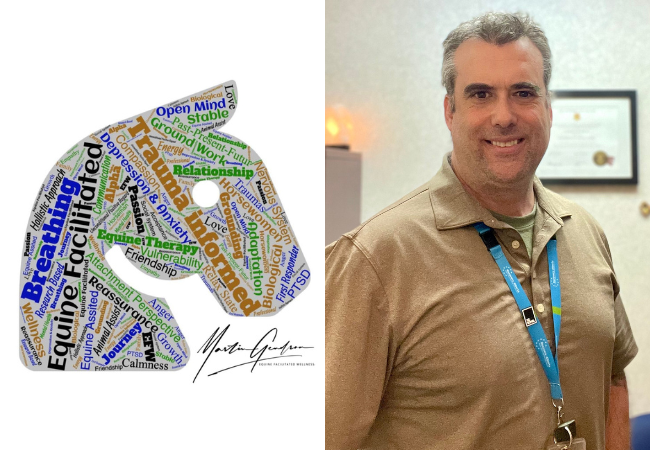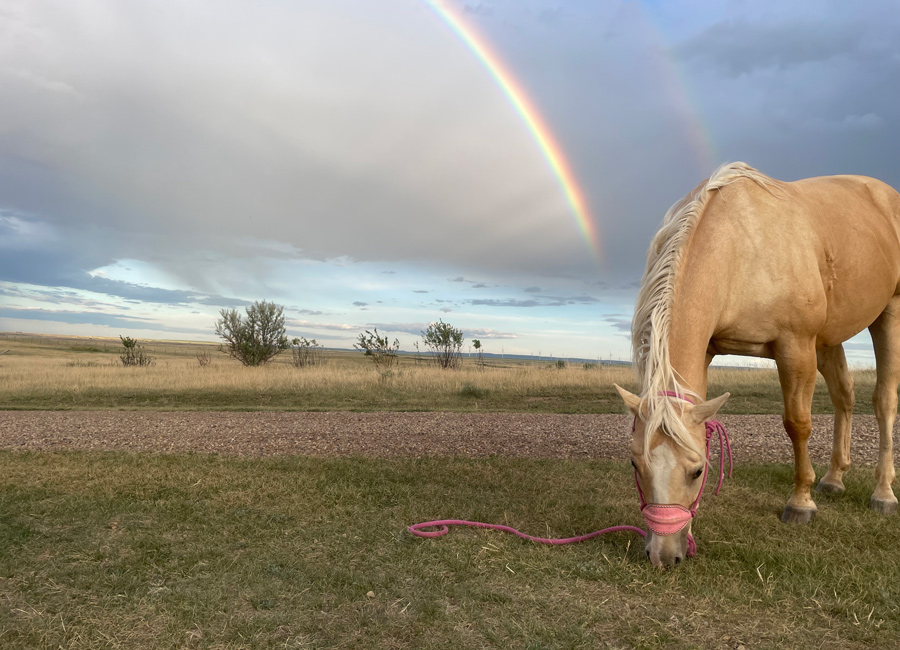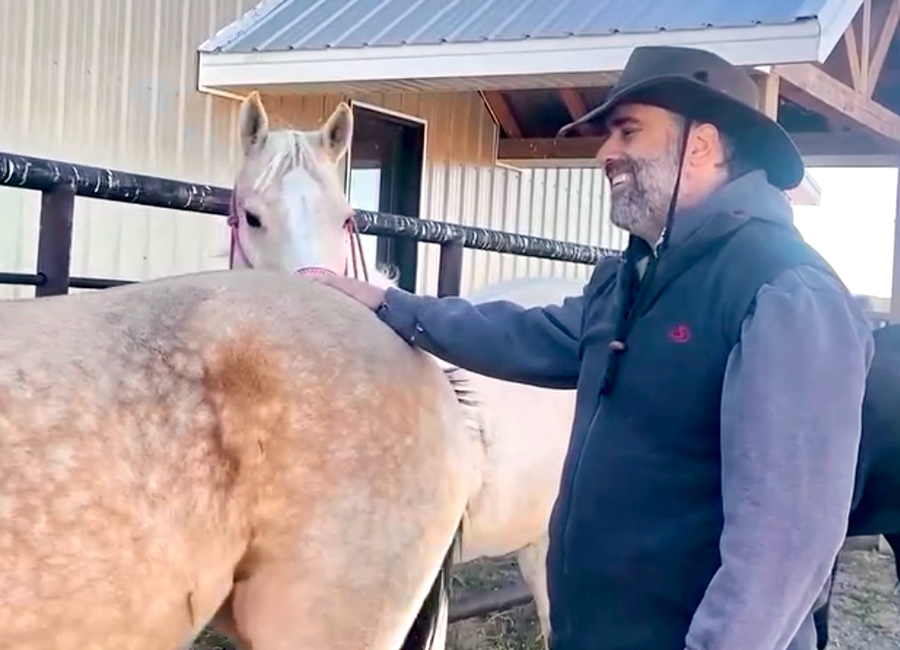
When Martin Gendron joined the Canadian Armed Forces in 2003, he was seeking stability and purpose. What he found was a decade-long career as a military medical specialist – and a journey that would ultimately transform how he helps others heal from trauma.
Today, the Master of Arts in Counselling Psychology (MACP) graduate operates Gendron Equine Wellness in Cypress County, Alberta, where he practices psychotherapy with some unexpected co-therapists: his stable of five horses.
His practice has become a sanctuary for fellow veterans, first responders, and others struggling with trauma, offering an alternative path to healing that, for some, feels safer and more natural than a traditional office setting.
A Career Cut Short
Gendron’s own military career came to an end after an ambulance he was transporting a patient to the hospital in was involved in a serious accident. It was a collision that left him with a broken lumbar vertebra that never properly healed. As arthritis set in and chronic pain became his constant companion, he faced a difficult decision.
“The pain was constantly growing every year,” Gendron said. “At some point I decided to leave the military.”
After his medical release, Gendron and his wife, who works as an elementary school teacher, settled in Medicine Hat, Alberta for a fresh start. But the transition to civilian life proved challenging for Gendron, who struggled with anxiety, depression, and anger, compounded by years of poorly managed chronic pain.
“I tried a lot of different jobs after the military, and I kept lying to myself about the type of job I could do,” he said. “Working in the emergency field as a medic was my sense of belonging.”
Finding a New Path
With support from Veterans Affairs Canada, Gendron decided to return to school, first earning a Bachelor of Social Work, then pursuing graduate studies at Yorkville University.
The decision to enroll in Yorkville’s MACP program came down to two key factors: a 25 per cent tuition discount for military veterans through the Yorkville’s Canadian Forces Bursary, and the flexibility the school offered to start sooner than other programs.
“The (bursary) Yorkville offers military veterans to me was what made me say, ‘Okay, let’s do this,'” Gendron said. “And everything that I learned in the program? Definitely, it’s something that I’m doing on a regular basis now in my practice.”

The Healing Power of Horses
Before even beginning his MACP degree, Gendron had already discovered the healing power of horses – and that connection, for him, was immediate and profound.
“I was introduced to a few people who were passionate about horses, and also equine-assisted therapy and I started to take some workshops and training,” he said. “I was really intrigued and I felt that connection with horses helping me.”
For his Bachelor of Social Work research project, Gendron even opted to conduct a study on himself, documenting how spending time with horses improved his quality of life and well-being through daily journal entries.
“Connecting with the animal allowed me to take my healing to the next level,” he said. “Just touching the animal, walking in the field with them, connecting with them – everything is so calm, everything is so relaxed.”
After purchasing a farm in 2014, Gendron gradually built what would become Gendron Equine Wellness, launching the practice in earnest while completing his master’s degree. He now works with five horses, including a miniature horse “just like a very big dog,” offering sessions that look very little like traditional therapy.
A Different Kind of Therapy
There’s little, if any, riding involved in Gendron’s equine-assisted therapy practice. Instead, clients work with horses on the ground – grooming, walking, exercising, or simply standing and doing breathing exercises beside the 1,200-pound animals.
That approach, Gendron has found, is particularly effective for veterans and first responders who aren’t ready for traditional talk therapy.
“If the person is coming to me and they don’t really want to talk too much, they’re not quite ready? There’s nothing wrong with that,” he said. “We focus on the horse, we focus on the horsemanship and connection. Then after a session, two sessions, three sessions, the person starts to open up a little bit, and then a little bit more.”
The horses themselves play a crucial therapeutic role. As prey animals, they’re very sensitive to human emotions and intentions – a survival mechanism Gendron harnesses for healing.
“The horse mirrors what’s going on inside the person,” he explained. “The client may seem to have a poker face, but I see the horse is reacting, telling me that there’s something else going on inside of you. And then we explore that a little bit further.”
Each client is matched with a specific horse through a careful process. In their second session, after their intake, clients meet all five horses one at a time, spending a few minutes with each one. Gendron watches the interactions between each horse and client, looking for a mutual connection.
“The horse has a choice,” he said. “I’m giving a voice to the horse. I’m giving consent to the horse. When I see the connection from both – all right, this is the horse we’re going to work with.”

Why It Works for Veterans
Gendron is careful to note that equine-assisted psychotherapy isn’t superior to other therapeutic approaches – it’s simply another option that works for some people. But there’s something about the format that particularly resonates with military veterans and first responders.
“Their mind doesn’t go wandering as easily when they are beside the horse,” he explained. “Their mind is like, ‘Oh, something is happening here right now. We have to pay attention to what’s here right now.’ And I’m using that to explore different things.”
The outdoor setting, the focus on an external relationship, the gradual building of trust – all of it creates a therapeutic environment that feels less intimidating to some than sitting across from someone in an office for 50 minutes.
Gendron said most of his clients commit to six to eight sessions, though he emphasizes that mental health is an ongoing journey. After completing their treatment plan, clients move on to their next step – whether that’s traditional therapy, reconnecting with family and community, or simply having built enough momentum to continue healing on their own.
Remembrance Day Reflections
As Remembrance Day approaches, Gendron plans to attend his local parade in Medicine Hat, as he does most years. It’s a day he dedicates to remembering those he knew and lost in the military, and to reflecting on the sacrifices – both his own and his family’s.
“My family went through some challenges while I wasn’t there for them,” he said. “So, I spend Remembrance Day remembering all of those things.”
He wishes more Canadians understood that military-related mental health challenges extend far beyond PTSD.
“A lot of people don’t have PTSD in the military, but they still have a lot of mental health challenges,” he said. “And if the people around them – the community, the work suervisors, the family members, the neighbours, the best friends, the nurses and doctors at the hospitals – if they don’t understand that type of trauma and the type of mental health issues that come from working in the military, it increases the challenge.”
The military, he notes, doesn’t often do a good job of teaching service members how to sit with their emotions or navigate challenges, especially once they’ve retired.
“In the military, you follow orders, and that can be helpful when you’re still in, because you’re action driven and your emotions don’t get in the way,” he said.
“But what happens when, later on, you go back into the civilian world? What happens when you’re with your family and your child is having challenges, or your wife, or you yourself? Many soldiers don’t know how to deal with that.”
Full Circle
For Gendron, being able to help others through their mental health journeys is part of his own ongoing healing. The medic who once stabilized patients in crisis situations has found a new way to offer care – one that honors both his military service and his deep connection to animals and nature.
“Being in a helping profession and helping other people is my core value. It’s who I am,” he said. “By helping my clients, it allows me to reflect on who I am and to keep going. I’m also becoming more patient with myself, building patience and kindness toward myself.”






